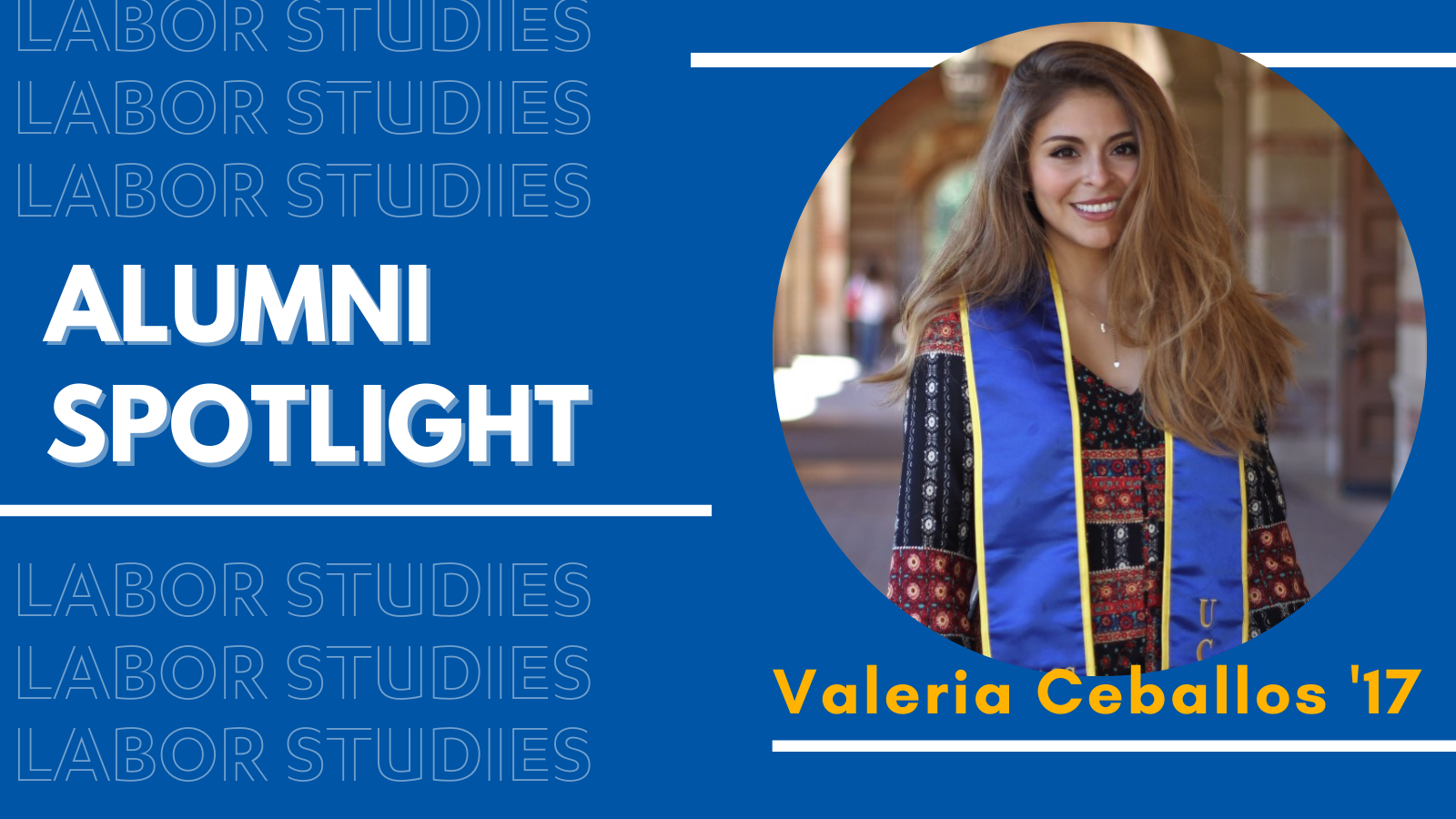Labor Studies Alumni Spotlight: Valeria Ceballos, Master of Public Policy Graduate Student & Researcher
by Guadalupe Guzman
1. Can you tell us about yourself?
I am currently a first year Master of Public Policy graduate student at the Luskin department at UCLA. My policy interests are Immigration, International Development and Comparative Policy, and Social Policy. Before starting my Master education, I was a transfer undergraduate student at UCLA and after graduation I took two years away from academia to figure out my next academic steps. While at UCLA as an undergrad I majored in Anthropology and minored in Labor Studies. I am originally from Chile, but have lived most of my life here in Los Angeles and Van Nuys, CA.
2. Can you tell us about your current Graduate Student Researcher position and your Master program?
I am a Graduate Student Researcher (GSR) for the Undocumented Students Program (USP) at UCLA. I am very fortunate to work with a close and supportive team. Some of my most recent work has involved working in projects such as UndocuBruin Fellowship with USP and various events for the student body at UCLA. My master of Public Policy is a very rigorous program that supports various policy interests; they are hands on with their students and their students’ educational goals. It brings me a lot of joy to know I am affiliated with a progressive and well-informed program.
3. What made you want to join the Labor Studies program?
As an undocumented individual, particularly before DACA was established, we’re very often victims of stolen wages and under-protected in the workplace, as well as easy targets to injustices within labor. Some of my first courses at UCLA helped me understand the bigger picture and the necessity of unions. I was inspired by some of my core courses to question the capacity of human rights within the workforce and I realized that by joining the labor studies program I would be able to expound on the knowledge of labor rights and labor justice.
4. What about the Labor Studies Minor had the most impact on you?
I feel my experience at UCLA would have been very different if I had not joined the labor studies program. Primarily because UCLA is a vast campus with diverse students and communities, I had questions and interests that integrated my community and their wellness in manners that only the labor studies program courses were able to truly expound on. The biggest impact came from the program’s opportunity to work with unaccompanied minors, as well as its detailed immersion into the history of unions, immigration, and labor laws. This program gave me the education that I required to find agency within myself as an undocumented student and as an aspiring academic.
5. During your time at UCLA, were you involved in any campus activities on campus or within your community?
While at UCLA I worked part time with the Early Academic Outreach Program as a Bruin Advisor, where I supported high school students in Van Nuys, CA on a variety of subjects and recommended courses of action to overcome social, cultural, linguistic, and economic barriers they were likely to find on their route to higher education. I also became involved with the “You Are Not Alone” Migrant Children’s Program, where I worked with unaccompanied minor children from Latin America living in my home city of Van Nuys, CA. As a Bruin counselor and tutor I had the opportunity to learn about these children’s’ transition to the U.S. This experience was extremely rewarding for me especially because it is always ideal that when assisting a community, the community and their individuals have a say and a platform to help better shape the support they may receive; currently that is something we are still striving for, but I had yet to see it in action. Working with unaccompanied minors and as a Bruin Advisor literally placed me in a position where I was not just helping my community, but I had a say and my opinion mattered. That was incredibly inspirational to me, as it inspired me to challenge myself and realize that it is not idealistic to expect community individuals to be involved in the support or changes of their community—it is necessary. I absolutely thank the Labor Studies Minor for the education that I received, for it did not only educate me to be a better community leader and potentially help many more people, but it granted me self-efficacy within spaces that I first did not think I belonged to.
6. Do you have any advice for graduating seniors?
My advice for graduating seniors is to continue asking questions, utilize creativity as much possible, and keep that academic curiosity alive. No matter where life may take us, at the end of the day we bring along what we have learned and our current state of mind. Do not forget to take care of yourself, thank yourself for the amount of knowledge you have learned. You are powerful, you are strong, you are capable and you have done a lot. We need you as we progress and attempt to create a more just world, so keep your head high, your heart strong, and appreciate yourself for all that you have accomplished. We are all very proud of you.


